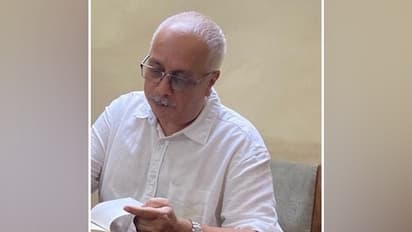Bangladesh unrest: Non-state actors part of students’ protests, claims historian Soumitra Banerji

Synopsis
Banerji also urged upon the government to adopt strong arm strategy on the international border. The historian stressed that the protests in Bangladesh must have been planned and coordinated with the involvement of the “non-state actors”.
Non-state actors part of Bangladesh students’ protests, says historian Soumitra Banerji, who came out with a book on India’s partition – Liminal Tides – told Asianet Newsable's Anish Kumar that “non-state actors could have been involved in making a highly successful students’ protests in Bangladesh”. Banerji also urged upon the government to adopt strong arm strategy on the international border. The historian stressed that the protests in Bangladesh must have been planned and coordinated with the involvement of the “non-state actors”. He answered a few questions on the prevailing situations in Bangladesh.
Qn. Do you think that foreign actors may also be involved in ousting Sheikh Hasina from power?
Banerji: I would be pleasantly surprised if they weren’t. In international politics we always have wheels within wheels; and Non-State Actors are an effective tool of influence to catalyse instability.
On the contrary, I would be surprised to know that they were just college students who orchestrated a coupe and ousted the Prime Minister of Bangladesh, who, over the period of time started to wield immense power and influence, not only within Bangladesh, but even internationally.
Qn. What advice will you like to give to our government to deal with situations emerging out of Bangladesh?
As I have already mentioned before, Strategic Containment might be the only sane way forward. By Strategic Containment, I mean the following approaches:
• Continuous monitoring of situation on ground; and evolve our doctrine accordingly.
• The ultimate objective is to assist Bangladesh to stabilise; since we cannot afford any further destabilisations, more than what already exists. We need to remember that an unstable neighbour will be a drain on India, both economically, as well as geopolitically.
• In times as what we are facing, a strong-arm strategy is required on the borders. As of now India Border needs to be closed for business…to be slowly loosened as the situation permits. At the same time there needs to be an increased strategic reconnaissance on our Western Borders as well.
• A ringfence of likeminded allies, with commonality of interests, to form an association of protection for Bangladesh, in not being manipulated further towards a negative trajectory.
• Finally, effective diplomacy and dialogues with all stakeholders.
Qn. Do you think India should worry at the rise of hardliners in Bangladesh?
Hardliners have been a perpetual problem with India, within and without. India has been unfortunate to be landlocked by vested interests and envy. I would refer it to be a complicated neighbourhood. Hence hardliners, not only in Bangladesh, but anywhere in proximity have to be ideally contained, as also we should be well prepared with a counterstrategy.
Qn. How do you look at the students’ protests in Bangladesh? Is there any parallel with pre-partition days there?
Students have always been a voice and substance in any kind of activism and protest, world over. Even during the Indian Independence movement, Students have been seen to be giving form and content to the leaders to achieve objectives. However, they are and have been a mass that needs to be led. There might be majorly few instances of a Student who has the guts and strategic guile to own and lead a protest to its fulfilment.
Hence, in the case of Bangladesh, we can be quite sure of the presence of a team of nonstate actors directing this highly successful coupe to an astute perfection.
Stay updated with the Breaking News Today and Latest News from across India and around the world. Get real-time updates, in-depth analysis, and comprehensive coverage of India News, World News, Indian Defence News, Kerala News, and Karnataka News. From politics to current affairs, follow every major story as it unfolds. Get real-time updates from IMD on major cities weather forecasts, including Rain alerts, Cyclone warnings, and temperature trends. Download the Asianet News Official App from the Android Play Store and iPhone App Store for accurate and timely news updates anytime, anywhere.